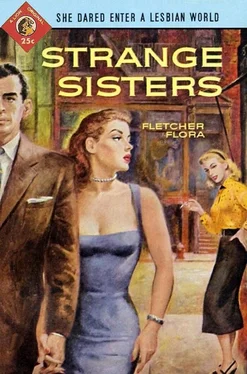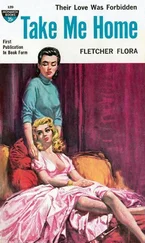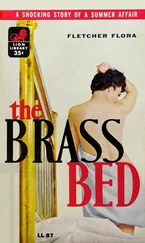“I’m sorry to have kept you waiting so long,” he said.
“It’s all right.”
“Have you had any breakfast?”
“No.”
“Would you care for some?”
“I’m not hungry, thank you.”
“Some coffee, at least?”
“No. No, thank you.”
He picked up a six-sided pencil and turned it in his fingers. He turned it slowly, so that each side came on top in turn, and he studied each side carefully, especially the side with the printing on it, before turning the pencil again.
“Do you understand why you are here, Miss Gait?”
“No,” she lied.
“You have no idea at all?”
“No.”
“It’s odd that you’re so docile about it. Most people kick up a fuss if they feel we’ve brought them in without justification.”
She said nothing, having no words to explain her emotional exhaustion even if it had been advisable to do so, and he looked up at her from the pencil with heavy eyes.
“Why did you try to leave town this morning, Miss Gait?”
“I wanted to go home. Back to the town where I was born. I bought a ticket on the bus, and I was going. Is that wrong?”
“It depends. You just decided all at once to go? At five o’clock in the morning? There are frequent buses that way, Miss Gait. Why didn’t you decide to go at a more convenient time?”
“I don’t know. I do things like that. I just make up my mind to do something, and I go ahead and do it.”
“Is that so?” His tone inferred a broader significance in her words than she had intended. “Sometimes that isn’t so wise. To act precipitately, I mean. Sometimes it’s better to think about a thing.”
There was no response she dared to make, and so she was silent again, waiting for him to continue.
“Do you remember the man who called on you yesterday, Miss Gait?”
“Yes. It was Sergeant Tromp. I didn’t remember his name, but he told me again this morning.”
“Good. Do you remember what he said to you, or what you said to him?”
This was danger. This was the gap, the hiatus, the threat of the unknown. There was a sudden pain in her chest, a tightening noose around her heart, but she managed to answer quietly.
“No. I’d been drinking, you see.”
“I know. And you remember nothing?”
“Yes. Nothing.”
He released his breath in a long sigh and looked down at the pencil, revolving it slowly in his fingers.
“Then we’ll have to start fresh. There was a man, Miss Gait. His name was Angus Brunn, and he was murdered. Did you know him?”
Her first thought was to lie, but then she remembered in time the notebook with her name in it, and she decided it would be better to tell part of the truth and to lie only about the things they probably didn’t know.
“Angus Brunn?” she said, and she was surprised and a little replenished to discover how lightly the terrible name lay on her tongue. “Yes, I knew an Angus Brunn. I knew him very slightly.”
“Have you seen him recently?”
“I don’t know. I may have. One meets people here and there.”
“I don’t mean that. Not a casual meeting. Have you had a date with him, for instance? Been alone with him?”
Again she started to lie, and again she decided in time that it would be better to tell part of the truth. Because she had stood in a line under bright light for the inspection of whose eyes she did not know, and maybe they were the eyes of the taxi driver who had driven her and Angus Brunn to Brunn’s apartment, and maybe they were the eyes of someone unknown who had seen her going into or coming out of the apartment, but whosoever they were, they might have remembered what they saw, and the simple fact that the identification routine had been used was proof that they had seen something.
She folded her hands in her lap and looked down at them and spoke so softly that Ridley had to lean forward across his desk to catch the words.
“All right. I was there. In his apartment, I mean. I went there with him the night he was killed. Night before last, it was.”
He nodded his head slowly without looking at her. “That’s good, Miss Gait. It’s always better to tell the truth. Why did you lie to begin with?”
“I didn’t lie.”
“That’s true. You didn’t. You were merely evasive. Why were you evasive, Miss Gait?”
“I was frightened. I thought I might be suspected.”
“Is that why you tried to leave town?”
“Yes.” -
“Tell me what happened in Angus Brunn’s apartment night before last.”
“While I was there?”
“Yes. Of course.”
“Nothing much. He... he gave me a drink. Then he started doing something I didn’t like... getting familiar. So I left.”
“What time was it when you got there?”
“I don’t remember exactly. Around midnight, I think.”
“And when you left?”
“Maybe half an hour later. Maybe not quite so long.”
“I see. Did you meet anyone afterward?”
“No.”
“Where did you go?”
“Home. Back to my apartment.”
“Do you know if Angus Brunn planned to see anyone else after you left him?”
“No. He may have, but I don’t know.”
“Do you know of anyone who had a reason to want him dead?”
“No. I don’t really know much about him at all.”
“I see. As you know from the newspapers, he was stabbed with an ice-pick. All the evidence shows that he was approaching the person who stabbed him. This indicates that the killer might have been defending himself against an attack. Such a theory is supported also by the fact that Brunn’s face had been badly clawed. You said that you left his apartment because he became offensive Miss Gait. How offensive?”
The noose around her heart was now drawn so tight that she thought she would surely scream with the pain just as soon as she could gather enough breath. She had quite forgotten the marks on Angus Brunn’s face, but more threatening by far in the consideration of her own security, she had also forgotten the torn nails on her right hand. She clenched the hand nervously, digging the nails into her palm.
She whispered, “He didn’t get violent, if that’s what you mean.”
“That isn’t quite what I mean.” He smiled thinly. “At least, it isn’t what I’m most interested in at the moment. What I’m most interested in is, did you get violent?”
“No. I just left. I told you I just left.”
“May I see your hands, please?”
She looked across into his face as if she were mentally deficient, or a little deaf, her lips slightly apart in a rather adenoidal expression and her eyes dull.
“What?”
“Your hands, please. I’d like to see them.”
She extended her arms, hands turned palms up, and he smiled patiently and rather sadly.
“Palms down, please.”
She turned them down slowly, and he leaned forward and peered briefly at the torn nails and then leaned back again with a sigh and closed his eyes.
“How did you tear your nails, Miss Gait?”
“I... I don’t remember.”
“You don’t remember? I should think it would be quite painful, tearing your nails like that. Surely you can remember if you try.”
“I... I think I did it opening a package. Yes. Yes, that’s it. I remember now. It was a cardboard box, and the flaps that came together on top were glued down tightly. I pulled them loose with my fingers, and I tore the nails.”
He opened his eyes and repeated his thin smile, and she knew that he believed nothing of what she said, but he didn’t pursue the matter because the lie was patent, and it was something he could come back to when he was ready. The lines seemed to deepen in his thin, old-looking face, and the sadness deepened and darkened in his eyes.
Читать дальше











